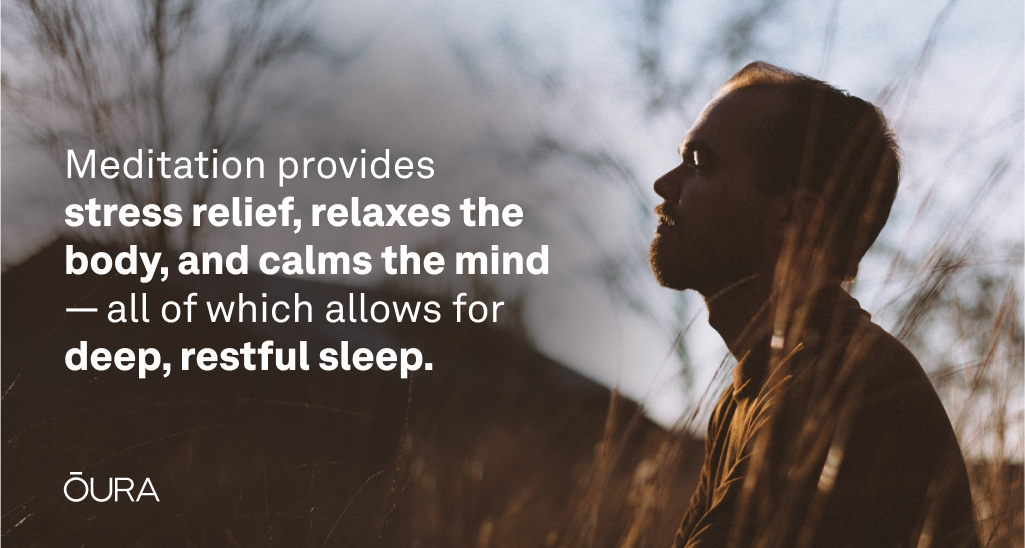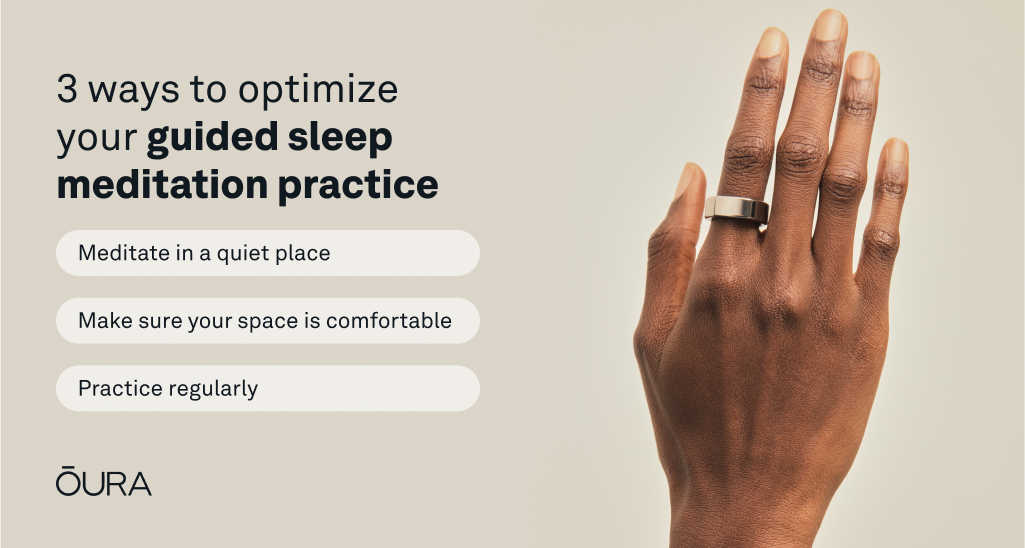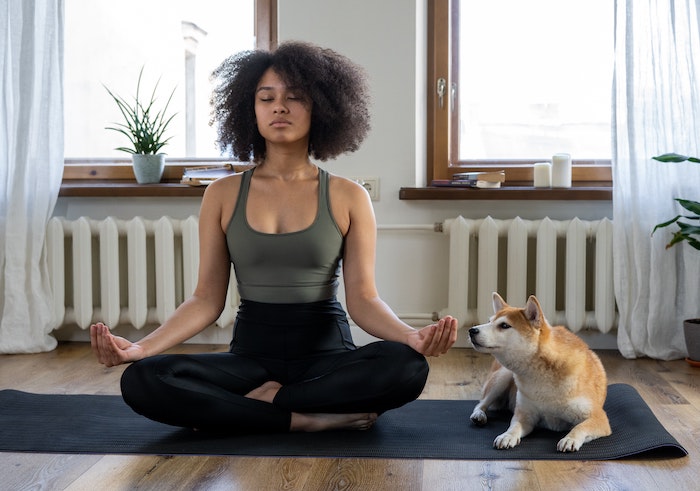Struggling with sleep can be a vicious cycle — the less you sleep, the more stressed you become, and the harder it is to fall and stay asleep.
After a bad night’s sleep, you may go to bed with a sense of anxiety, already anticipating poor sleep. Your stress response kicks in, inhibiting your sleep, and the cycle continues.
Many people who have problems sleeping — whether with falling asleep at night or waking up in the middle of the night — have found success using guided meditations for sleep — such as those found in the Oura App Explore tab.
While further research is still needed, studies indicate that meditation may improve sleep quality and help you fall into a deep sleep more easily.
Listening to a guided meditation before bed can help you let go of anxiety and fall asleep fast so that you wake up feeling refreshed and ready to start your day.
Let’s take a look at the benefits of guided meditation for sleep, different types of sleep meditation, and some tips to make the most of your guided sleep meditation practice.
Why Use Guided Sleep Meditations?
There are many types of meditation that people use for better sleep, whether it’s rain sounds, meditation music, binaural beats, or a spoken meditation where a voice gently guides you into deep relaxation.
These spoken meditations are particularly helpful for beginners or people who aren’t used to meditating regularly. When you listen to a guided meditation, it’s like having a meditation teacher right there in the room with you.
By listening to the voice and following its instructions, your brain can enter a relaxed state, helping you fall asleep more quickly, sleep more soundly, and stay asleep throughout the night.
If you have trouble sleeping, guided meditation may benefit you in the following ways.
It May Help Balance Hormones and Blood Pressure
While more research is needed into the effects of meditation on hormones, some research indicates that it may help balance hormones for optimal sleep.
For example, there is some evidence that meditation boosts melatonin, a hormone that plays a vital role in sleep and regulating circadian rhythms. Other research suggests that meditation also promotes the production of serotonin, a chemical precursor to melatonin.
Another study found that meditation reduces the stress hormone cortisol. High levels of cortisol can make it difficult to fall asleep and negatively affect sleep quality, so lowering it can promote a better night’s sleep.
There is also evidence that meditation lowers your blood pressure and heart rate, which relaxes your body and prepares you for sleep. It may even help improve Heart Rate Variability (HRV).
Oura members can track their HRV throughout the night to see how guided meditations benefit their sleep.
It Helps Improve Sleep Quality

Given its effects on our stress and relaxation hormones, it’s not surprising that studies have shown meditation improves sleep quality.
Essentially, meditation provides stress relief, relaxes the body, and calms the mind — all of which allows for deep, restful sleep.
It Can Increase Sleep Duration
In addition to improving sleep quality, meditation has also been shown to increase sleep duration.
It Can Help You Fall Asleep Faster
The time it takes to fall asleep is called sleep latency, and those with insomnia or other sleep disorders tend to have prolonged sleep latency. In other words, it takes them longer to fall asleep.
Research shows that meditation can help improve sleep latency and reduce the time it takes to fall asleep at night.
A recent study of the Oura member community showed that those who tagged Meditation in the Oura App had an 8% improvement in sleep latency!
5 Types of Guided Sleep Meditations for a Good Night’s Sleep
Ready to try out guided sleep meditation for yourself? Here are five tried-and-tested techniques that will help you fall asleep faster and sleep deeply until morning.
Below each meditation type is a 30-second snippet of a meditation from the Oura App Explore tab, so you can get a sense of what it’s like. If you’re an Oura member, be sure to check out the full versions in the Explore Tab, which has over 70 guided meditations to try. Bonus: You’ll get biofeedback from your meditation session in the Oura App, which will help you understand how your body reacted to that particular session.
1. Body Scan Meditation
A body scan meditation is exactly what it sounds like — you mentally ‘scan’ your body by bringing awareness to each body part one at a time.
Focusing on your physical body helps to switch off your brain and stop racing thoughts in their tracks. It also activates your parasympathetic nervous system, which is responsible for your relaxation response.
If you have an overactive mind, try this meditation to release mental and physical tension and fall asleep easily.
Example from the Oura App Explore tab:
2. Visualization Meditation
Visualization meditations use guided imagery to help induce a state of relaxation.
There are various types of visualization meditation. For example, you can think about how you want to feel (such as “relaxed”), then assign a color to the feeling and visualize that color.
Some guided visualizations take you on a journey to a place where you feel relaxed — whether real or imagined — while others help you imagine your goals, which might include feeling well-rested or having a healthy sleep routine.
Example from the Oura App Explore tab:
3. Breathwork
Breathing exercises — also known as breathwork — involve mindfully observing your breath while controlling your inhalation and exhalation. This can help you relax and improve the quality of your sleep.
There are a variety of breathing techniques that can help you sleep better. For example, box breathing works well as a sleep meditation.
Example from the Oura App Explore tab:
4. Mindfulness Meditation
Mindfulness is a buzzword in the wellness world these days, but all it really means is being aware of what you’re doing while you’re doing it.
Mindfulness meditation for sleep requires paying attention to what’s going on in your body, mind, and physical environment.
For example, you might start by focusing on what’s around you — such as the temperature of the air, the feeling of your clothes against your skin, or any sounds you might hear.
Then, you can turn your attention inward, listening to the body and simply observing any physical sensations you might be experiencing or thoughts or emotions that arise.
Example from the Oura App Explore tab:
5. Counting
It seems that the old sleep remedy of counting sheep may not be so far off the mark since counting can, indeed, help you fall asleep.
This type of meditation involves giving the mind a counting task — one that is gentle enough to allow you to switch off and sleep well. For example, you might count your breaths or try counting backward from 20.
Counting takes your mind elsewhere, so it can be helpful if you struggle to switch your brain off when practicing mindfulness-based meditation techniques.
Example from the Oura App Explore tab:
How to Make the Most of Your Guided Sleep Meditation
Before you start your meditation, it’s essential to cultivate a relaxation-inducing environment that will support your efforts.
Follow these three tips to optimize your guided sleep meditation practice for the best results.

Meditate in a Quiet Place
Meditation requires concentration, so make sure your environment is distraction-free.
Turn off your phone notifications, close the door, and let the people you live with know that you’re meditating so that they don’t disturb you.
Make Sure Your Space Is Comfortable
Being comfortable is a must during meditation. If you’re uncomfortable, you won’t be able to focus, which will prevent you from entering into a meditative state.
No matter where you’re sitting or lying, make sure you’re warm enough and have plenty of pillows and blankets for maximum comfort.
Find a comfortable position you can maintain throughout the meditation so that you don’t get distracted by movement.
For example, many people prefer to lie down because sitting cross-legged causes pins and needles in their feet. The other advantage of lying down to meditate is that it allows you to drift straight off into sleep without having to move.
Practice Regularly
If, at first, you don’t succeed, don’t sweat it. Meditation requires practice, and most people find it difficult to concentrate at first.
Like a muscle, you can strengthen your meditation abilities through regular practice. Meditating every day will likely produce more benefits for your sleep than practicing sporadically.
If your mind wanders during meditation, know that this is completely normal. Whenever you notice yourself getting distracted, simply return your attention to the voice guiding you.
With time, your ability to concentrate during guided meditation will improve.
Get a Good Night’s Sleep with Oura’s Guided Sleep Meditations
Guided meditations are a great way to relax your mind and body, helping you fall asleep faster, stay asleep longer, and get better quality sleep.
Oura members can use personal sleep data to further optimize sleep. The Oura Ring tracks biometric data — such as your heart rate — during the night that show the physiological results of your meditation session.
This allows you to experiment with different sleep hygiene practices to improve the quality of your sleep.
As noted above, Oura’s Explore Tab has over 70 guided meditations to try. If you notice that a particular session helps you relax and lower your heart rate, you can add it to your routine.
Additionally, the Oura App tells you how much Deep Sleep, Light Sleep, and REM Sleep you get during the night so you can be aware of any disturbances and look for their possible causes.
READ MORE: Restless Sleep? How to Stop Tossing and Turning at Night











